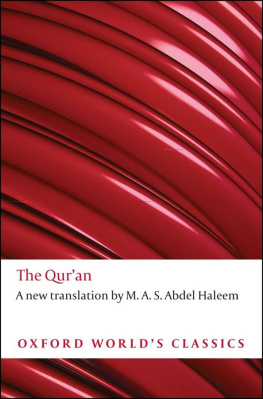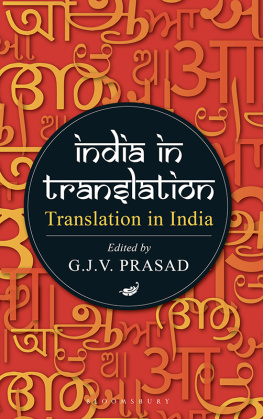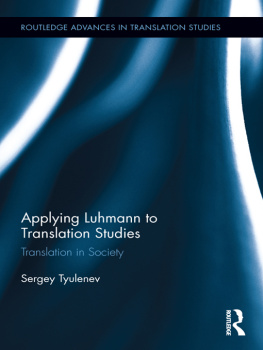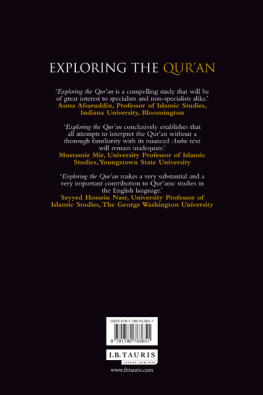Haleem - The Qur’an: A New Translation
Here you can read online Haleem - The Qur’an: A New Translation full text of the book (entire story) in english for free. Download pdf and epub, get meaning, cover and reviews about this ebook. year: 2005, publisher: Oxford University Press, genre: Religion. Description of the work, (preface) as well as reviews are available. Best literature library LitArk.com created for fans of good reading and offers a wide selection of genres:
Romance novel
Science fiction
Adventure
Detective
Science
History
Home and family
Prose
Art
Politics
Computer
Non-fiction
Religion
Business
Children
Humor
Choose a favorite category and find really read worthwhile books. Enjoy immersion in the world of imagination, feel the emotions of the characters or learn something new for yourself, make an fascinating discovery.
- Book:The Qur’an: A New Translation
- Author:
- Publisher:Oxford University Press
- Genre:
- Year:2005
- Rating:5 / 5
- Favourites:Add to favourites
- Your mark:
- 100
- 1
- 2
- 3
- 4
- 5
The Qur’an: A New Translation: summary, description and annotation
We offer to read an annotation, description, summary or preface (depends on what the author of the book "The Qur’an: A New Translation" wrote himself). If you haven't found the necessary information about the book — write in the comments, we will try to find it.
Haleem: author's other books
Who wrote The Qur’an: A New Translation? Find out the surname, the name of the author of the book and a list of all author's works by series.
The Qur’an: A New Translation — read online for free the complete book (whole text) full work
Below is the text of the book, divided by pages. System saving the place of the last page read, allows you to conveniently read the book "The Qur’an: A New Translation" online for free, without having to search again every time where you left off. Put a bookmark, and you can go to the page where you finished reading at any time.
Font size:
Interval:
Bookmark:

Great Clarendon Street, Oxford OX2 6DP
Oxford University Press is a department of the University of Oxford.
It furthers the Universitys objective of excellence in research, scholarship,
and education by publishing worldwide in
Oxford New York
Auckland Cape Town Dar es Salaam Hong Kong Karachi
Kuala Lumpur Madrid Melbourne Mexico City Nairobi
New Delhi Shanghai Taipei Toronto
With offices in
Argentina Austria Brazil Chile Czech Republic France Greece
Guatemala Hungary Italy Japan South Korea Poland Portugal
Singapore Switzerland Thailand Turkey Ukraine Vietnam
Oxford is a registered trade mark of Oxford University Press
in the UK and in certain other countries
Published in the United States
by Oxford University Press Inc., New York
M. A. S. Abdel Haleem 2004, 2005
The moral rights of the author have been asserted
Database right Oxford University Press (maker)
First published 2004
First published, with corrections, as an Oxford Worlds Classics paperback 2005
All rights reserved. No part of this publication may be reproduced, stored in a retrieval system, or transmitted, in any form or by any means, without the prior permission in writing of Oxford University Press, or as expressly permitted by law, or under terms agreed with the appropriate reprographics rights organizations. Enquiries concerning reproduction outside the scope of the above should be sent to the Rights Department, Oxford University Press, at the address above
You must not circulate this book in any other binding or cover
and you must impose this same condition on any acquirer
British Library Cataloguing in Publication Data
Data available
Library of Congress Cataloging-in-Publication Data
Koran. English.
The Quran / a new translation by M. A. S. Abdel Haleem.
p. cm. (Oxford worlds classics)
Originally published: 2004.
Includes bibliographical references and index.
I. Abdel Haleem, M. A. II. Title. III. Oxford worlds classics (Oxford University Press)
BP109 2005 297.122521dc22 2004030574
ISBN 0192831933
1
Typeset in Ehrhardt
by RefineCatch Limited, Bungay, Suffolk
Printed in Great Britain by
Clays Ltd, St Ives plc
OXFORD WORLDS CLASSICS
For over 100 years Oxford Worlds Classics have brought readers closer to the worlds great literature. Now with over 700 titlesfrom the 4,000-year-old myths of Mesopotamia to the twentieth centurys greatest novelsthe series makes available lesser-known as well as celebrated writing.
The pocket-sized hardbacks of the early years contained introductions by Virginia Woolf, T. S. Eliot, Graham Greene, and other literary figures which enriched the experience of reading. Today the series is recognized for its fine scholarship and reliability in texts that span world literature, drama and poetry, religion, philosophy and politics. Each edition includes perceptive commentary and essential background information to meet the changing needs of readers.
Refer to the to navigate through the material in this Oxford Worlds Classics ebook. Use the asterisks (*) throughout the text to access the hyperlinked Explanatory Notes.
OXFORD WORLDS CLASSICS


A new translation by
M. A. S. ABDEL HALEEM

OXFORD WORLDS CLASSICS
THE QURAN is the supreme authority in Islam. It is the fundamental and paramount source of the creed, rituals, ethics, and laws of the Islamic religion. This supreme status stems from the belief that the Quran is the word of God, revealed to the Prophet Muhammad via the archangel Gabriel, and intended for all times and all places.
The Quran was the starting point for all the Islamic sciences, which were developed in order to study its grammar, pronunciation, and style, and it is the basis of Islamic law and theology; indeed, as the celebrated fifteenth-century scholar and author Suyuti said, Everything is based on the Quran. The entire religious life of the Muslim world is built around the text of the Quran. As a consequence of the Quran, the Arabic language moved far beyond the Arabian peninsula, deeply penetrating many other languages within the Muslim landsPersian, Turkish, Urdu, Indonesian, and others. The first sura (or section) of the Quran, al-Fatiha, which is an essential part of the ritual prayers, is learned and read in Arabic by Muslims in all parts of the world, and many other verses and phrases in Arabic are also incorporated into the lives of non-Arabic-speaking Muslims.
M. A. S. ABDEL HALEEM was born in Egypt, and learned the Quran by heart from childhood. Educated at al-Azhar, Cairo, and Cambridge Universities, he has taught Arabic at Cambridge and London Universities since 1966, including courses in advanced practical translation and the Quran. He is now Professor of Islamic Studies at the School of Oriental and African Studies, University of London. His most recent publications are Understanding the Quran: Themes and Style (2001) and English Translations of the Quran: The Making of an Image (2004). He is also working on An Arabic-English Dictionary of Quranic Usage, with El-Said Badawi. He is the editor of the Journal of Quranic Studies and the London Quranic Studies series.
THE QURAN is the supreme authority in Islam. It is the fundamental and paramount source of the creed, rituals, ethics, and laws of the Islamic religion. It is the book that differentiates between right and wrong, so that nowadays, when the Muslim world is dealing with such universal issues as globalization, the environment, combating terrorism and drugs, issues of medical ethics, and feminism, evidence to support the various arguments is sought in the Quran. This supreme status stems from the belief that the Quran is the word of God, revealed to the Prophet Muhammad via the archangel Gabriel, and intended for all times and all places.
The Quran was the starting point for all the Islamic sciences: Arabic grammar was developed to serve the Quran, the study of Arabic phonetics was pursued in order to determine the exact pronunciation of Quranic words, the science of Arabic rhetoric was developed in order to describe the features of the inimitable style of the Quran, the art of Arabic calligraphy was cultivated through writing down the Quran, the Quran is the basis of Islamic law and theology; indeed, as the celebrated fifteenth-century scholar and author Suyuti said, Everything is based on the Quran. The entire religious life of the Muslim world is built around the text of the Quran. As a consequence of the Quran, the Arabic language moved far beyond the Arabian peninsula, deeply penetrating many other languages within the Muslim landsPersian, Turkish, Urdu, Indonesian, and others. The first sura (or section) of the Quran, al-Fatiha, which is an essential part of the ritual prayers, is learned and read in Arabic by Muslims in all parts of the world, and many other verses and phrases in Arabic are also incorporated into the lives of non-Arabic-speaking Muslims.
Muslim children start to learn portions of the Quran by heart in their normal schooling: the tradition of learning the entire Quran by heart started during the lifetime of the Prophet and continues to the present day. A person attaining this distinction becomes known as a
Next pageFont size:
Interval:
Bookmark:
Similar books «The Qur’an: A New Translation»
Look at similar books to The Qur’an: A New Translation. We have selected literature similar in name and meaning in the hope of providing readers with more options to find new, interesting, not yet read works.
Discussion, reviews of the book The Qur’an: A New Translation and just readers' own opinions. Leave your comments, write what you think about the work, its meaning or the main characters. Specify what exactly you liked and what you didn't like, and why you think so.







